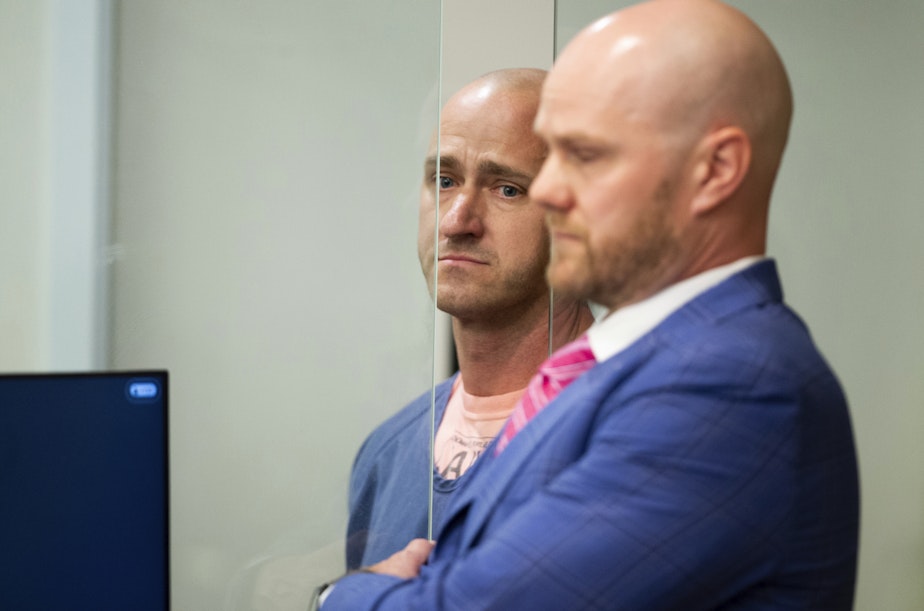In wake of Alaska's mid-air scare, researcher cites mental health gaps for commercial pilots

Last Sunday night, an Alaska Airlines jet operated by Horizon Air left Everett on a flight to San Francisco. Soon after takeoff, one of the pilots called in a security threat from inside the cockpit.
What happened on that flight is raising questions about mental health care for commercial jet pilots.
This interview has been edited for clarity.
Joseph Emerson, an off-duty pilot, was riding in a jump seat on the flight deck of Alaska Airlines Flight 2059. He reportedly said, "I’m not OK,” just before attempting to cut the engines.
In a statement, Alaska Airlines said, "The Captain and First Officer quickly responded, and the crew secured the aircraft without incident."
The plane was diverted to Portland, and Emerson was taken into custody. He was charged with and pleaded not guilty to multiple counts, including attempted murder.
Dr. William Hoffman is a neurologist and former air medical examiner. Through the University of North Dakota, he does research on the brain health of pilots.
Sponsored
This time last year, he wrote an opinion piece for Scientific American titled, “We Need to Change the System That Keeps Pilots from Seeking Mental Health Care.”
He talked to KUOW’s Kim Malcolm about the incident and the larger mental health picture.
Kim Malcolm: When you heard about this incident, what was the very first thing that you thought?
Dr. Hoffman: Of course, any event like this, our heart goes out to the many people involved in this circumstance. But we feel that stories like this speak to the broader narrative about the evolving data about the health behavior of pilots and existing questions about mental health and aviation.
Court documents show that Joseph Emerson had been struggling with depression. He had also recently had a required medical certification renewed. So, clearly, something got missed, or something that should have happened didn't happen. What is the gap there?
Sponsored
During a pilot's periodic health assessment, where they are assessed to determine whether or not they meet medical standards, the key tool that we have is asking pilots if there's been a change in status, for example, new symptoms or a new diagnosis. But the evolving data suggest that some pilots are left weighing the risks of disclosing health information against the benefit of seeking care, or what that might mean for their flying certificate.
The Federal Aviation Administration regulates pilot health, and airlines support pilots’ health care for their employees to one degree or another. Are the regulators and the airlines doing enough to ensure that pilots get the support they need and that the flying public is safe?
Well, first and foremost, it is so important to state that aviation is exceptionally safe. And that is made so by redundancies in the system and the highly professional work of airline pilots. And so that cannot be understated. But as a relates to achieving mental wellness in aviation in the system of the future, it's important to view that different stakeholders have different lenses. As a regulator, one of the primary value systems is, of course, safety. And aviation is very safe. For operators like airlines, oftentimes incentives center around profitability and financial metrics. Right now, airlines are exceptionally profitable. But we as clinicians caring for pilots see that the key voice that's missing here is the voice of the pilot patient. I think there might be an opportunity to have a conversation about how we build this into the system of the future.
You advocated for some of these changes a year ago, in your opinion piece. Have you seen any changes happen in that time?
One thing, I think should be said very clearly is that there have been objective positive steps forward. And these include the addition of new medications that we can use to certify pilots. For example, the addition of Wellbutrin, the acceleration of certain protocols to allow pilots to go back to flying quicker, and then a really robust education effort, in addition to peer support programs, which are growing quickly. So I think there are many reasons to feel hopeful that some really marked progress is being made. But there appear to be opportunities to continue to improve.
Sponsored
You mentioned earlier that there was some misinformation floating out there among the pilot community about when to go get care and when not to. What message would you have for a pilot who is weighing those decisions?
Well, first is to normalize and say that that pilot is absolutely not alone. And importantly, if a pilot feels that they need help, they should absolutely get help sooner rather than later. And that's for a couple of reasons. One, by seeking care earlier, the hope is for there to be clinical resolution quicker, and if so, that will allow as things currently stand for a more accelerated recertification.
And also more broadly, all stakeholders in aviation have a responsibility to combat misinformation. You absolutely can be an airline pilot and be on an SSRI, which is a drug class for mood. You can absolutely be an airline pilot and have spoken to a therapist. It's important to combat that misinformation to help keep pilots safe and to promote wellness in the system.
Listen to the interview by clicking the play button above.





